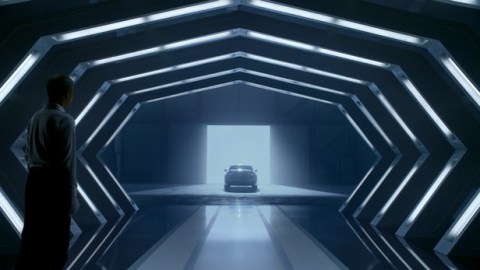Watch: The first AI-scripted commercial is here, and it’s surprisingly good

Lexus
- The commercial was written by IBM’s Watson. It was acted and directed by humans.
- Lexus says humans played a minimal part in influencing Watson, in terms of the writing.
- Advertising, with its clearly defined goals and troves of data, seems like one creative field in which AI would prove particularly useful.
IBM’s Watson supercomputer is the author of a script recently used in a Lexus commercial, marking a first for the advertising and AI industries.
To create the commercial, which was acted and directed by humans, Watson was given 15 years’ worth of award-winning commercials, a trove of data showing when consumers tended to connect most emotionally with advertisements, and further data from an experiment conducted by the University of New South Wales’ MindX, which analyzed how highly intuitive people respond to car advertising.
Strangely, the ad is about a car that’s about to be destroyed by humans but manages to save itself through its sentience.
It depicts an emotional Takumi (Japanese artisan) expressing a silent goodbye to the AI-equipped Lexus he created. The car ventures out into the world, but dark clouds soon appear. It becomes clear the Lexus must undergo a crash test in a menacing facility, which it passes by using its AI-equipped braking system, much to the relief of the Takumi watching the test on TV at home.
“When I was handed the script, the melodrama of the story convinced me of its potential,” director Kevin Macdonald, who’s directed films such as The Last King of Scotland and State of Play, said in a statement. “The fact that AI gave a fellow machine sentience, placed it in a sort of combat situation, and then had it escaping into the sunset was such an emotional response from what is essentially a digital platform.”
Macdonald also noted that humans did intervene into the project with “a nudge here and there.” But, considering Lexus hasn’t released the script, it’s unclear how closely the finished commercial matches up with Watson’s original script. Those involved with the project simply suggested Watson was able to extract the best aspects of manmade commercials from the past.
“The magic of storytelling will always come to life in the human creative process,” said Reece Medway, media and entertainment specialist for IBM Watson in the U.K. and Ireland. “Using Watson to identify the common attributes for truly award-winning creative work is an example of how man and machine will collaborate in the AI era.”
You can watch the commercial below.
Is AI coming after creative jobs?
It seems likely that AI could eventually replace jobs like cashier, truck driver, data analyst and even accountants. What’s harder to imagine, but increasingly plausible, is how AI could soon begin replacing jobs in more creative fields—journalism, entertainment and, especially, advertising.
AI has already made breakthroughs—some more impressive than others—in multiple creative endeavors. In music, an AI has combined the mathematical properties of disparate instruments to create sounds never before heard by humans. In visual art, an auction house has already sold the first AI-produced produced artwork, for a price of $432,000, and there’s also an algorithm that can draw anything you want, though the results aren’t always intelligible. And in entertainment, AIs have also written scripts, including one that, while mostly ridiculous, managed to capture some of the rhythm and conventions of science fiction writing.
But it’s in advertising—a field with a clearly defined parameters and goals—that AI seems likely to be most effective.
“Advertising, more than music, movies, art or entertainment, is the perfect incubation bed for this kind of technology,” wrote Loz Blain for New Atlas. “Where you have a measurable result to grade the art against, it’s easy for an algorithm to decide what has been effective and what hasn’t, and tune itself up to improve its performance over time. Advertising is an art form designed purely to manipulate. You better believe that ad agencies will use every tool in their arsenal to get the job done.”
Still, considering Lexus admitted giving a “nudge” here and there to Watson, it could be a long time before the industry’s top copywriters start fearing for their jobs.





